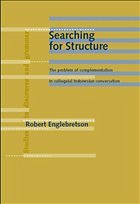Nicht lieferbar

Searching for Structure
The problem of complementation in colloquial Indonesian conversation
Versandkostenfrei!
Nicht lieferbar
Main description:This book argues against the existence of complementation in colloquial Indonesian, and discusses the ramifications of these findings for a discourse-functional understanding of grammatical categories and linguistic structure. Based on a close analysis of a corpus of spontaneous conversational Indonesian data, the author examines four construction types which express what is often encoded by complements in other languages: juxtaposed clauses, material introduced by the discourse marker bahwa, serial verbs, and epistemic expressions with the suffix -nya. These four construction...
Main description:
This book argues against the existence of complementation in colloquial Indonesian, and discusses the ramifications of these findings for a discourse-functional understanding of grammatical categories and linguistic structure. Based on a close analysis of a corpus of spontaneous conversational Indonesian data, the author examines four construction types which express what is often encoded by complements in other languages: juxtaposed clauses, material introduced by the discourse marker bahwa, serial verbs, and epistemic expressions with the suffix -nya. These four construction types offer no evidence to support complementation as a viable grammatical category in colloquial spoken Indonesian. Rather, they are best understood as emergent, discourse-level phenomena, arising from the interactive and communicative goals of language users. The lack of evidence for complementation in colloquial Indonesian reaffirms the need to understand linguistic structure as language-particular and diverse, and emphasizes the centrality of studying linguistic categories based on their actual occurrence in natural discourse.
Table of contents:
- Acknowledgments
- 1. Preliminaries
- 2. Juxtaposed clauses
- 3. Complementizers in context: An analysis of bahwa
- 4. Verbs in series
- 5. Epistemic 2; nya constructions
- 6. Conclusion
- References
- Appendices
- Name index
- Subject index
This book argues against the existence of complementation in colloquial Indonesian, and discusses the ramifications of these findings for a discourse-functional understanding of grammatical categories and linguistic structure. Based on a close analysis of a corpus of spontaneous conversational Indonesian data, the author examines four construction types which express what is often encoded by complements in other languages: juxtaposed clauses, material introduced by the discourse marker bahwa, serial verbs, and epistemic expressions with the suffix -nya. These four construction types offer no evidence to support complementation as a viable grammatical category in colloquial spoken Indonesian. Rather, they are best understood as emergent, discourse-level phenomena, arising from the interactive and communicative goals of language users. The lack of evidence for complementation in colloquial Indonesian reaffirms the need to understand linguistic structure as language-particular and diverse, and emphasizes the centrality of studying linguistic categories based on their actual occurrence in natural discourse.
Table of contents:
- Acknowledgments
- 1. Preliminaries
- 2. Juxtaposed clauses
- 3. Complementizers in context: An analysis of bahwa
- 4. Verbs in series
- 5. Epistemic 2; nya constructions
- 6. Conclusion
- References
- Appendices
- Name index
- Subject index




